#the undercommons: fugitive planning & black study
Text
The rise of logistics is rapid. Indeed, to read today in the field of logistics is to read a booming field, a conquering field. In military science and in engineering of course, but also in business studies, in management research, logistics is everywhere. And beyond these classic capitalist sciences, its ascent is echoed ahistorically in the emerging fields of object-oriented philosophy and cognitive neuroscience, where the logistical conditions of knowledge production go unnoticed, but not the effects. In military science the world has been turned upside down. Traditionally strategy led and logistics followed. Battle plans dictated supply lines. No more. Strategy, traditional ally and partner of logisitics, is today increasingly reduced to collateral damage in the drive of logistics for dominance. In war without end, war without battles, only the ability to keep fighting, only logistics, matters.
And so too business innovation has become logistical and no longer strategic. Business innovation of course does not come from business. It is more often derived from military strategies of resistance to its own armies, transferred free to business. Once this consisted in transferring innovations like the line and the formation and the chain of command from military science to the factory and the office, or transferring psychological and propaganda warfare to human relations and marketing. These were free transfers of strategic innovation, requiring managers to instantiate and maintain them. No more. As everything from the internet to the shipping container testify, in keeping with cold wars and wars on terror that lead always to the failure of strategy, it is logistical free transfers that matter. Containerisation was failing as a business innovation until the American government used containers to try to supply its troops in South East Asia with enough weapons, booze, and drugs to keep them from killing their own officers, to keep a war going that could not be won strategically. Those who dreamt of the internet, if not those who built it, were precisely worried about the corruption of intelligence that the outbreak of democracy, as the Trilateral Commission thought of it, made possible in the 1970s. ARPANET as an intelligence gathering network could not have its head turned by sex or ideology, much less the powerful combination of the two. It would not be confused by the outbreak of democracy. And it assumed a never-ending accumulation of intelligence for a never-ending war that many would not want to fight. To Toni Negri’s challenge, show me a business innovation and I will show you a worker’s rebellion, we could add a pre-history the state fearing its own workforce.
-Fred Moten and Stefano Harney, "Fantasy In The Hold," The Undercommons: Fugitive Planning & Black Study
22 notes
·
View notes
Text
Stefano Harney on study.
0 notes
Note
are there any books i can read to learn more about university abolition?
Fred Moten and Stefano Harney, The Undercommons: Fugitive Planning and Black Study (Brooklyn: Minor Compositions, 2013) [link: open access pdf]
Dylan Rodriguez, “Racial/colonial Genocide and the Neoliberal Academy: In Excess of a Problematic.” American Quarterly 64.4 (2012)
la paperson, A Third University Is Possible (Minneapolis: University of Minnesota Press, 2017)
The Imperial University: Academic Repression and Scholarly Dissent. Edited by Piya Chatterjee and Sunaina Maira. Minneapolis: University of Minnesota Press, 2014
Review essay: "Critical University Studies and the Crisis Consensus." Abigail Boggs and Nick Mitchell. Feminist Studies 44 (2): 432-463 (2018)
Clyde W. Barrow, Universities and the Capitalist State: Corporate Liberalism and the Reconstruction of American Higher Education, 1894-1928 Madison: University of Wisconsin Press. 1990
Eli Meyerhoff, Beyond Education: Radical Studying for Another World (Minneapolis: University of Minnesota Press, 2019).
418 notes
·
View notes
Text
"I think you can make a good case that human being in the world is, and should be, sheer criminality. Which also, first and foremost, implies that making laws is a criminal activity."
- Fred Moten & Stefano Harney, The Undercommons: Fugitive Planning & Black Study
24 notes
·
View notes
Text

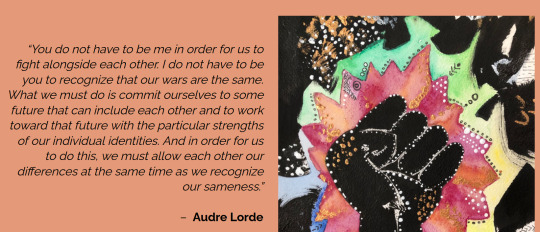
Look: the problematic of coalition is that coalition isn't something that emerges so that you can come help me, a maneuver that always gets traced back to your own interests. The coalition emerges out of your recognition that it's fucked up for you, in the same way that we've already recognized that it's fucked up for us. I don't need your help. I just need you to recognize that this shit is killing you, too, however much more softly, you stupid motherfucker, you know?

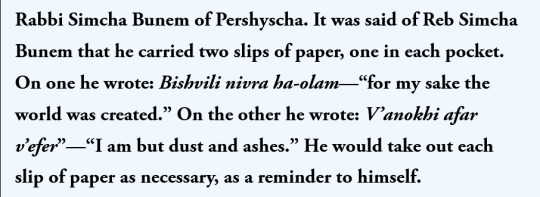

"none of us do anything alone. where would I be without the others? and where would any of them be without the rest of us?"
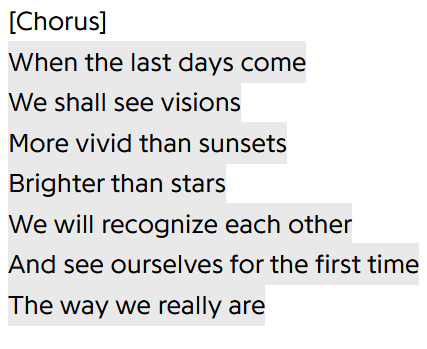
thoughts about community and exceptionalism and what we are owed and what we owe each other, inspired by a conversation about unions and the word entitlement
pirkei avot 1:14 // audre lorde, sister outsider: essays and speeches // fred moten, the undercommons: fugitive planning & black study, paraphrasing fred hampton and quoted in saving time: discovering a life beyond the clock by jenny odell // sense8 1.02 // x // tema okun, white supremacy culture - still here // own work in progress // "against pollution" by the mountain goats
5 notes
·
View notes
Text
We cannot say what new structures will replace the ones we live with yet, because once we have torn shit down, we will inevitably see more and see differently and feel a new sense of wanting and being and becoming […]
Jack Halberstam, “The Wild Beyond: With and for the Undercommons,” in The Undercommons: Fugitive Planning & Black Study, by Stefano Harney and Fred Moten (Minor Compositions, 2013), p. 6, quoted in Caroline Levine, “The Long Lure of Anti-Instrumentality: Politics, Aesthetics, and Sustainability,” Modern Fiction Studies 67.2 (2021), p. 226.
6 notes
·
View notes
Quote
If you want to know what the undercommons wants, … what black people, indigenous peoples, queers and poor people (the ‘we’ who cohabit in the space of the undercommons) want, it is this – we cannot be satisfied with the recognition and acknowledgement generated by the very system that denies a) that anything was ever broken and b) that we deserved to be the broken part; so we refuse to ask for recognition and instead we want to take apart, dismantle, tear down the structure that, right now, limits our ability to find each other, to see beyond it and to access the places that we know lie outside its walls. We cannot say what new structures will replace the ones we live with yet, because once we have torn shit down, we will inevitably see more and see differently and feel a new sense of wanting and being and becoming. What we want after 'the break’ will be different from what we think we want before the break and both are necessarily different from the desire that issues from being in the break.
Jack Halberstam, “The Wild Beyond: With and For the Undercommons,” as it appears in Fred Moten and Stefano Harney’s The Undercommons: Fugitive Planning & Black Study” (6)
62 notes
·
View notes
Quote
[L]ook: the problematic of coalition is that coalition isn’t something that emerges so that you can come help me, a maneuver that always gets traced back to your own interests. The coalition emerges out of your recognition that it’s fucked up for you, in the same way that we’ve already recognized that it’s fucked up for us. I don’t need your help. I just need you to recognize that this shit is killing you, too, however much more softly, you stupid motherfucker, you know?
fred moten, from a conversation with stefano harney in the undercommons: fugitive planning & black study, 2013
141 notes
·
View notes
Text
If we do not seek to fix what has been broken, then what? How do we resolve to live with brokenness, with being broke [...].
[W]e cannot be satisfied with the recognition and acknowledgement generated by the very system that denies a) that anything was ever broken and b) that we deserved to be the broken part; so we refuse [...].
While describing the London Riots of 2011, Harney suggests that the riots [...] do not separate out “the request, the demand and the call” -- rather, they enact the one in the other: “I think [...] the response is already there before the call goes out. You’re already in something.” You’re already in it. For Moten too, you are always already in the thing that you call for and that calls you. What’s more, the call is always a call to dis-order and this disorder or wildness shows up in many places: in jazz, in improvisation, in noise. [...] Listening to cacophony and noise tells us that there is a wild beyond to the structures we inhabit and that inhabit us. [...]
The path to the wild beyond is paved with refusal. [...] [I]f we begin anywhere, we begin with the right to refuse what has been refused to you. [...]
While we can circulate multiple critiques of gay marriage in terms of its institutionalization of intimacy, when you arrive at the ballot box, pen in hand, you only get to check “yes” or “no” and the no, in this case, could be more damning than the yes. And so, you must refuse the choice as offered. [...]
Moten and Harney also study what it would mean to refuse what they term “the call to order.” And what would it mean, furthermore, to refuse to call others to order, to refuse interpellation and the reinstantiation of the law. When we refuse [...] we create dissonance and more importantly, we allow dissonance to continue -- when we enter a classroom and we refuse to call it to order, we are allowing study to continue, dissonant study perhaps, disorganized study, but study that precedes our call and will continue after we have left the room.
These kinds of examples get to the heart of Moten and Harney’s world of the undercommons -- the undercommons is not a realm where we rebel and we create critique [...]. Our goal is not to end the troubles but to end the world that created those particular troubles [...].
Fanon, according to Moten, wants not the end of colonialism but the end of the standpoint from which colonialism makes sense. [...]
[We] refuse the logic that stages refusal as inactivity, as the absence of a plan and as a mode of stalling real politics.
-----
Jack Halberstam. “The Wild Beyond: With and for the Undercommons.” An introduction included in The Undercommons: Fugitive Planning and Black Study by Stefano Harney and Fred Moten (2013).
92 notes
·
View notes
Text
FRED [Moten]: I think, looking back at those earlier pieces, that we just kept pushing ahead, and kept moving, but that the movement was predicated on us trying to think about where we were at the time. These are the conditions under which we live and operate, and we need to try to think about that. There’s something wrong going on, let’s think about how it is and why it is that things aren’t the way we’d like them to be – and we just basically had the temerity to believe that our desire for some other mode of being in the world had to be connected to our attempt to understand the way that we were living and the conditions under which we were living at that moment. In other words, and to me this is a kind of crucial thing: I wasn’t thinking about trying to help somebody. I wasn’t thinking about the university as a kind of exalted place in which being there is a mark of a certain kind of privilege, and that the proper way to deal with or to acknowledge that privilege was to take this wisdom or to take these resources that I had access to and to try to distribute them in a more equitable way to the poor people who didn’t have the relation to the university that we did. Me, I never thought about it that way. I was just always like: the university is fucked up. It’s fucked up over here. Why is it fucked up? Why is it that shit ain’t the way it should be here? Yeah, there’s some stuff here, but obviously there’s stuff in other places too. The point is: it’s fucked up here, how can we think about it in a way to help us organize ourselves to make it better here? We were trying to understand this problematic of our own alienation from our capacity to study – the exploitation of our capacity to study that was manifest as a set of academic products. That’s what we were trying to understand. And it struck us that this is what workers who are also thinkers have always been trying to understand. How come we can’t be together and think together in a way that feels good, the way it should feel good? For most of our colleagues and students, however much you want to blur that distinction, that question is the hardest question to get people to consider. Everybody is pissed off all the time and feels bad, but very seldom do you enter into a conversation where people are going, “why is it that this doesn’t feel good to us?” There are lots of people who are angry and who don’t feel good, but it seems hard for people to ask, collectively, “why doesn’t this feel good?” I love poetry, but why doesn’t reading, thinking, and writing about poetry in this context feel good? To my mind, that’s the question that we started trying to ask.
STEVPHEN [Shukaitis]: It’s especially hard to ask that question in England where the assumption is that everyone’s miserable and very polite about it anyways.
FRED: But, that’s the insidious thing, this naturalisation of misery, the belief that intellectual work requires alienation and immobility and that the ensuing pain and nausea is a kind of badge of honor, a kind of stripe you can apply to your academic robe or something. Enjoyment is suspect, untrustworthy, a mark of illegitimate privilege or of some kind of sissified refusal to look squarely into the fucked-up face of things which is, evidently, only something you can do in isolation. It’s just about not being cut off like that; to study the general antagonism from within the general antagonism. My favorite movie is The Shoes of the Fisherman and I want to be like this character in it named Father Telemond. He believed in the world. Like Deleuze. I believe in the world and want to be in it. I want to be in it all the way to the end of it because I believe in another world in the world and I want to be in that. And I plan to stay a believer, like Curtis Mayfield. But that’s beyond me, and even beyond me and Stefano [Harney], and out into the world, the other thing, the other world, the joyful noise of the scattered, scatted eschaton, the undercommon refusal of the academy of misery.
-"The General Antagonism: An Interview With Stevphen Shukaitis," The Undercommons: Fugitive Planning & Black Study
#the undercommons: fugitive planning & black study#fred moten#stefano harney#stevphen shukaitis#quotes#emphasis mine
1 note
·
View note
Photo
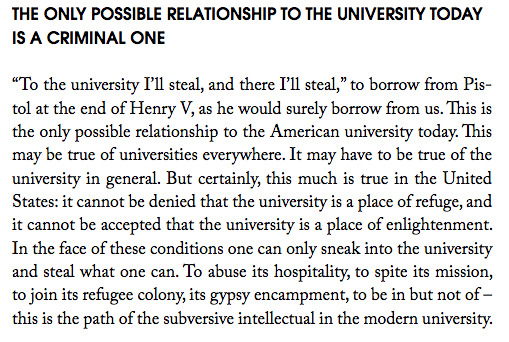
The Undercommons: Fugitive Planning & Black Study
Book by Fred Moten and Stefano Harney
4 notes
·
View notes
Text
"We run looking for a weapon and keep running looking to drop it."
- Fred Moten & Stefano Harney, The Undercommons: Fugitive Planning & Black Study
2 notes
·
View notes
Text
If public administration is the competence to confront the socialization thrown up continuously by capitalism and to take as much of that socialization as possible and reduce it either to something called public or something called private, then immediately all three scholarly positions become invalid. It is not possible to speak of a labor that is dedicated to the reproduction of social dispossession as having an ethical dimension. It is not possible to decide the efficiency or scope of such labor after the fact of its expenditure in this operation by looking at it once it has reproduced something called the public or something called the private. And its not possible to be critical and at the same time to accept uncritically the foundation of public administrationist thought in these spheres of the public and private, and to deny the labor that goes on behind the backs of these categories, in the undercommons, for instance, the republic of woman who run Brooklyn.
Fred Moten, Stefano Harney The Undercommons: Fugitive Planning and Black Study
4 notes
·
View notes
Quote
What is, so to speak the object of abolition? Not so much the abolition of prisons but the abolition of a society that could have prisons, that could have slavery, that could have the wage, and therefore not abolition as the elimination of anything but abolition as the founding of a new society.
Stefano Harney and Fred Moten, The Undercommons: Fugitive Planning & Black Study, p. 42.
17 notes
·
View notes
Quote
Justice is only possible where debt never obliges, never demands, never equals credit, payment, payback. Justice is possible only where it is never asked, in the refuge of bad debt, in the fugitive public of strangers not communities, of undercommons not neighbourhoods, among those who have been there all along from somewhere. To seek justice through restoration is to return debt to the balance sheet and the balance sheet never balances.
Stefano Harney and Fred Moten, The Undercommons: Fugitive Planning & Black Study. (2013, p. 63).
#setano harney#fred moten#the undercommons#undercommons#justice#debt#credit#capitalism#fugitivity#fugitive public#refuge
31 notes
·
View notes
Text
Now Available: Being Together Precedes Being, A Textbook for The Kids Want Communism (Archive Books, 2019)
Edited by Joshua Simon
Copies available here.
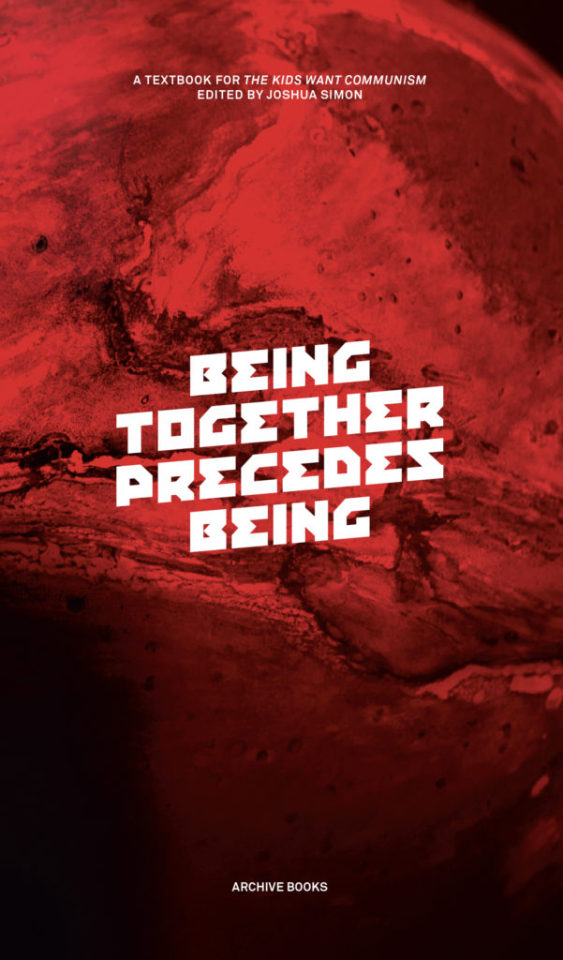
Even as global capitalism’s extremes of inequality, violence, nationalism, and imperialism expropriate the lives and futures of most of the planet, hope for another future, one of justice, solidarity, equality, and life, continues to burn. The works collected here not only attest to the fact that the kids want communism. They fuel the desire for communism with new memories of its past and imaginings of what communism can be for us again.
— Jodi Dean, author of The Communist Horizon
We want what we got! This riotous, ravenous collection of communisms past, present and future is what we want and what we got, what we’ve had, what we have, and what we can have again. But the only way to have it is to share it. And the only way to share it is to share it all. So share this amazing book that was brought together to bring together.
— Stefano Harney, co-author with Fred Moten of The Undercommons: Fugitive Planning and Black Study
In the turmoil leading to the October revolution Lenin wrote about the importance of finding a new slogan that will capture the totality of a specific historical situation. “The Kids Want Communism,” the title of the series of exhibitions documented in this volume, may be the appropriate slogan for today. This book brings new passions and joys to the spirit of communism, and reminds us that communism may be the truly human way of being together.
— Noam Yuran, author of What Money Wants: An Economy of Desire
This volume offers so much more than an updated version of Sartre’s famous dictum that existence precedes essence. Combining theory and practice, art and philosophy, politics and aesthetics, it is a resounding call to make communism a thing of the present.
— Bruno Bosteels, author of The Actuality of Communism
Contributions by Bini Adamczak, Odeh Al Ashhab, The New Barbizon Group (Asya Lukin, Natalia Zourabova, Olga Kundina, Anna Lukashevsky, Zoya Cherkassky) Toy Boy, Diego Castro, Angela Dimitrakaki, Paul Eluard, Max Epstein and Yuri Primenko, FAMU Archives (Piyasiri Gunaratna, Nosratollah Karimi, Nabil Maleh, Krishma Viswanath), Stano Filko, iLiana Fokianaki, Agnes Friedrich and Ivonne Dippmann, Tal Gafny, Jonathan Gold, Irena Haiduk, Nir Harel, Ronny Hardlitz, Raana Harlap, Micah Hesse, Yota Ioannidou, Nikita Kadan, Jakob Kösten, Konstantinos Kotsis, Mati Lahat, V.I Lenin, MAKI Archives, Alelsandr Medvedkin, Ohad Meromi, Olaf Nicolai, Tamar Nissim, Antonis Pittas, Praxis School Archive, Yakov Protazanov, David (Rabino) Rabinovici, Oleksiy Radynski, Yorgos Sapountzis, Joshua Simon, Tereza Stejskalová, Ian Svenonius, Kuba Szreder, Piotr Szulkin, Pelin Tan, The Union of Soviet Artists (Vasil Artamonov, Dominik Forman, Michael Hauser, Alexey Klyuykov, Avděj Ter-Oganjan), Vladimir Vidmar, Vangelis Vlahos, Nicole Wermers, Tony Wood, Noa Yafe, Dana Yoeli and Hila Laviv.
Specters are haunting the globe—the specters of anticommunism. From the European Union and its erosion to the disastrous “war of terror” and the destruction of the welfare state, from Wahhabism to neoliberalism, from debt economy to privatization, from game theory and disruptive innovation to cybernetics and the deployment of computerized surveillance/entertainment devices—all these anticommunisms are fighting one another, and they are now haunting us. What began with the implosion of real existing socialism almost thirty years ago comes full circle with the current collapse of the neoliberal arrangements that were then constituted.
Being Together Precedes Being offers a text book for the project “The Kids Want Communism,” which was initiated towards the 99th anniversary of the Soviet Revolution of October 1917 as a series of exhibitions, symposiums and conferences, screening programs, publications and a summer camp. In this textbook, communism does not merely describe an “us versus them” relation, but also offers that we are becoming the future. This trajectory of communism runs parallel to us at every single moment and its guiding principle is that being together precedes being.
Also see here.
3 notes
·
View notes